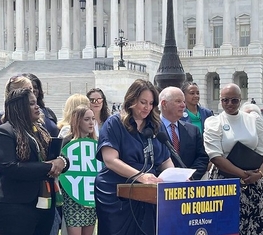Talking Points: Culturally Inclusive History Curriculum
Guidance and talking points to help Leagues navigate discussions and advocacy relating to history education in their communities.
This guidance and these talking points are designed to help Leagues navigate discussions and advocacy relating to history education in their communities. We encourage Leagues to join in the conversation around this topic so long as they feel that they have member understanding of League positions around this issue.
Throughout this guidance, we will not use the term “Critical Race Theory,” though the issue has gone by this name in public conversation. This is because Critical Race Theory does not refer to an actual curriculum but instead to an academic concept. As many have noted, “Critical Race Theory” is not an educational program being taught in schools, and the term itself has become very charged and easily misinterpreted. Therefore, we strongly suggest Leagues avoid the usage of the term “Critical Race Theory” and identify this educational teaching as “culturally inclusive history curriculum.”
The League supports the teaching of a culturally inclusive history curriculum that includes instruction in Black, brown, Indigenous, Latinx, Asian, Feminist, and Queer American history. This stance is grounded in several of the League’s official positions and in our Diversity, Equity, and Inclusion policy:
-
Equality of Opportunity
-
Education, Employment, and Housing: Support [federal] efforts to prevent and/or remove discrimination in education, employment and housing and to help communities bring about racial integration of their school systems.
-
The programs should be nondiscriminatory with provisions for enforcement.
-
-
Federal Role in Public Education
-
The League believes that an equitable, quality public education is critical for students.
-
Support federal policies that provide an equitable, quality public education for all children pre-K through grade 12.
-
-
Diversity, Equity, and Inclusion Policy: LWV is an organization fully committed to diversity, equity, and inclusion in principle and in practice. Diversity, equity, and inclusion are central to the organization’s current and future success in engaging all individuals, households, communities, and policy makers in creating a more perfect democracy.
There shall be no barriers to full participation in this organization on the basis of gender, gender identity, ethnicity, race, native or indigenous origin, age, generation, sexual orientation, culture, religion, belief system, marital status, parental status, socioeconomic status, language, accent, ability status, mental health, educational level or background, geography, nationality, work style, work experience, job role function, thinking style, personality type, physical appearance, political perspective or affiliation and/or any other characteristic that can be identified as recognizing or illustrating diversity.
TALKING POINTS:
-
The League of Women Voters supports a comprehensive history education for all students.
-
The League of Women Voters supports all histories being taught in school, including Black, Indigenous, Latinx, Asian, Feminist, and Queer American history.
-
A complete education requires a comprehensive approach that is inclusive of all American cultures. The teaching of history must reflect the perspectives and experiences of of marginalized groups.
-
The League of Women Voters believes in creating a more just, equitable, and inclusive democracy. The teaching of comprehensive American history is integral to this effort.
Related Content
Use this guidance and these talking points to help pressure candidates to join your debates or fill out your voter guides.
Talking points and FAQs for Leagues to use when discussing filibuster reform publicly, with voters or media.




